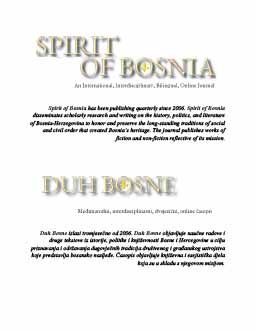
We kindly inform you that, as long as the subject affiliation of our 300.000+ articles is in progress, you might get unsufficient or no results on your third level or second level search. In this case, please broaden your search criteria.

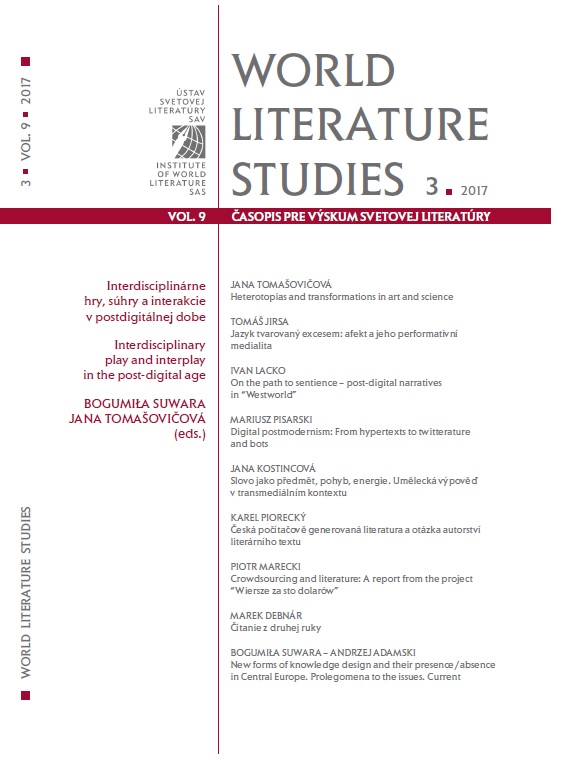
Since the end of the 1950s, computer-generated literary texts have been a marginal but ever-present part of many national literatures including the Czech one. This study primarilycharts the history of this phenomenon on the Czech cultural scene. Its material scope extendsfrom experiments in the 1960s (by Jiří Levý and Karel Pala) and the metaliterary reflectionsof Jiří Drašnar with computer-distorted texts to contemporary conceptual procedures (e. g.glitch aesthetics in Impromptu by Roman Haisel) and literary experiments with artificial intelligence.Attention is also focused on its forays into pop culture (Google poetry). More generalquestions on the authorship of literary texts in particular are then formulated, and a proposedpluralist conception of authorship as a collective of human and technological actors is presented,based on analysis of generative literature output.
More...
The article substantiates that the contradictory realities of the formation of the digital space are reflected in all spheres of life of society and individuals and determine the trends in the formation of digital man. The digital man is considered as the main object and subject of information relations in the information society in the latest stages of its development. This is based on the postmodern type of homo intelligent, able to process information, creating new information phenomena, relationships and structures. It is shown that the convergence of artificial intelligence technologies, machine learning and powerful databases capable of using an unlimited amount of information for processing, classification and muluple usage is a fundamental factor in the transition to digital man in the information society.
More...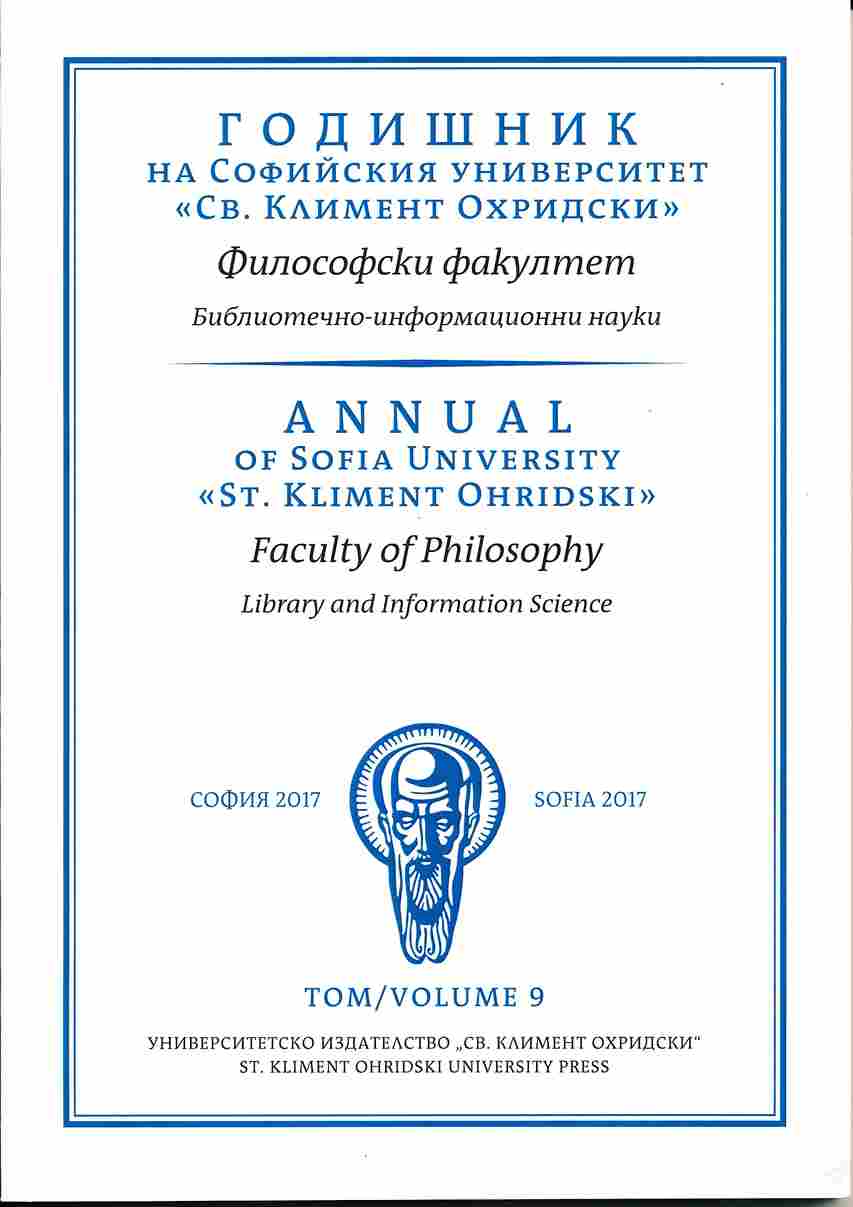
The publication summarizes the results of a study carried out within the framework of a thematic project of the Department of Library and Information Studies and Cultural Policy, Faculty of Philosophy of Sofia University: “Evaluation of the information value of the websites of regional libraries in Bulgaria. Designing a recommended website model, reflecting the performance of the regional library.” The publication summarises the results of a study by the Department of Library and Information Studies and Cultural Policy (DLISCP) of the University of Sofia on the "Assessment of the information value of the websites of regional libraries in Bulgaria. Development of a recommended website model reflecting the performance of the regional library." Regional libraries (RLs) are seen as modern organisations, which need to increase the visibility of their capabilities in order to find partnerships and to demonstrate their real benefit to people and society. The websites (Internet pages) of RLs play a role in shaping public perceptions of their effectiveness and attitudes towards their activities and services. In the context of the Information Age, the adequate presentation of RLs in the virtual space is a prerequisite for the full use of their potential and for an objective assessment of their importance for addressing the challenges of the period. Within the framework of a thematic project, a survey of the state of the websites of the 27 RLs was carried out according to a system of indicators presented in a matrix. The websites of 12 public libraries in other European countries were also reviewed, following similar indicators. The collected and systematically organised data serve to assess the state of the websites of the Bulgarian RLs, as well as to compare the approaches to their construction with those in other European countries. The results of the surveys and the comparisons that were made serve as a basis for the development of a sample model for the information architecture of the Internet pages of RLs. The principles for its development focus on modern approaches for the engaging presentation of the effectiveness of public libraries in the virtual space.
More...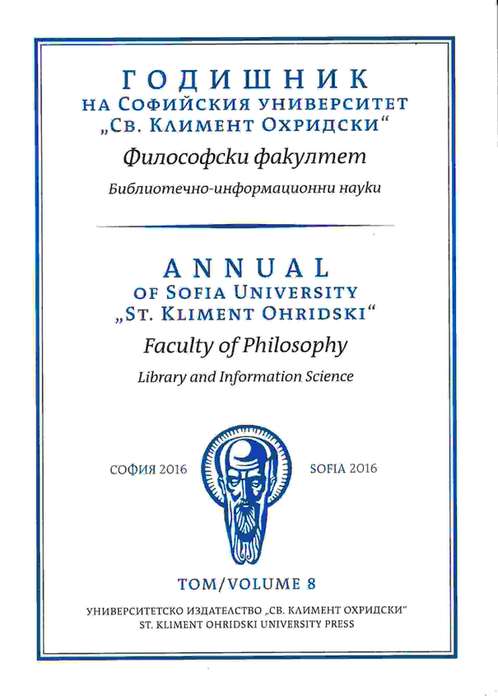
Library infrastructure is seen as a part of the infrastructure of culture, education and science in the country. The article reviews the organization of libraries in territorial systems and networks, as well as the availability and development of the hierarchical and coordinative relations between them. An attempt to delineate and expand the notion of library infrastructure – in addition to libraries and library networks are included several components, that are not typical for this infrastructure, but are significant for its develoрment. These components are library education and library science (library research); library associations and library literature and publication (media). The aim is to focus on developing a strategy for library infrastructure that is based on the vision of widely available, high quality and efficient library services that meet the needs of users in today's society.
More...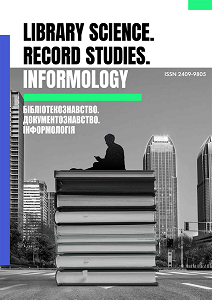
Global transformations necessitate a re-evaluation of training models for library and information specialists and the modernisation of educational programmes to meet new professional challenges and competencies, including entrepreneurial skills. The aim of the article is to analyse the conditions for ensuring the development of entrepreneurial competence elements among bachelor’s degree students in the specialty 029 “Information, Library and Archival Affairs” at higher education institutions in Ukraine through the lens of evolutionary transformations in higher library and information science education. The research employs a systematic approach, including analysis, synthesis, generalisation, and various analytical methods. Effective professional training in the library and information field relies on adapting educational programmes to rapidly evolving professional demands. Analysis of educational programmes at four institutions shows their potential to develop entrepreneurial skills through a variety of mandatory and elective courses, fostering competencies such as creative thinking, management, communication, and teamwork. Mastery of these skills is increasingly crucial for modern library and information professionals. It has been found that the compulsory educational components as well as the elective educational components from the catalogue of elective disciplines, selected from the educational programmes to assess the development of entrepreneurial competence in future specialists, highlight the uniqueness of each programme and reflect the educational institution’s overall approach to training bachelor’s students in this field. It is noted that the list of compulsory and elective educational components, according to a particular educational and professional programme, demonstrates a positive tendency in understanding the current needs of the industry and social requirements in general. The research results can be used to improve the content and structure of educational programmes for training specialists in the specialty 029 “Information, Library and Archival Affairs”, as well as to develop new syllabi and working programmes for educational components.
More...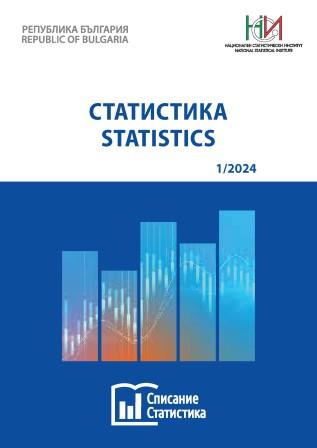
The National Statistical Institute has introduced a new software platform for its digital library, enhancing access to both contemporary and archival statistical data through an advanced information searching library system. Users have the opportunity to search the system by various characteristics of the editions in order to gain access to the digital copies. The new platform features a user-friendly interface, with enhanced search and access capabilities that reduce information clutter for clearer result visualization. The library system was developed by the Department of Mathematical Linguistics at the Institute of Mathematics and Informatics of the Bulgarian Academy of Sciences. The collaboration between the National Statistical Institute and leading information technology experts facilitates the use of digital library resources, marking a significant advancement in modernizing communication channels with the public.
More...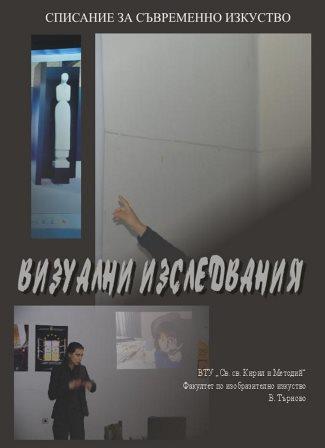
The paper is devoted to various creative approaches that an artist can apply to book design and illustration. These approaches are accompanied by examples of works by famous artists. The conclusion is made that the systematic analysis of creative approaches to book illustration in classes with students is important for increasing their visual literacy, activating creative thinking and developing professional skills.
More...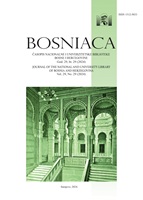
Goal: The goal of this research is to explore the patterns related to authorship and collaboration of authors of the papers published in the journal Bosniaca: Journal of National and University Library of Bosnia and Herzegovina in the period from 1996 to 2023. Approach/Methodology: During the selection and preparation of the corpus for analysis, bibliographic identifiers of published papers were analysed, and Subramanyam K. formula was used for calculation of the degree of collaboration. A total of 328 papers and 392 authors by occurrence were analyzed (227 unique authors). Results: Identification data of published papers in the period from 1996 to 2023 are gradually stabilizing, and standardization of bibliographic data is accompanied by the strengthening of the international network of authors, and the indexing of the Journal in bibliographic and citation databases. The number of single-authored papers published in the Journal is 85.98%, while the degree of collaboration in Bosniaca from 1996 to 2023 is 0.14, with the number of co-authored papers increasing from 2019. Of those analyzed, the largest number of unique authors comes from Bosnia and Herzegovina (132), followed by the countries of the region (69), and when it comes to the gender structure of unique authors, women are far more represented (159 authors, 70.04%), of which the majority, 88 female authors, also come from Bosnia and Herzegovina. Limitations: This research does not have firm criteria for selecting papers for analysis, also, nonstandardized listing of identification data of paper published in the first issues of the Journal, and manual entry of collected data can affect the research results and possible errors. Originality/value: So far in Bosnia and Herzegovina no bibliometric analysis of Bosnian and Herzegovinian journals in the field of library and information sciences have been conducted. As a contribution to such analysis, this paper presents the first bibliometric analysis of journal Bosniaca: Journal of the National and University Library of Bosnia and Herzegovina.
More...
Objective: This paper aims to explore the current state of artificial intelligence (AI) applications in academic libraries in Croatia and its potential impact on library services. It seeks to present the challenges and opportunities in AI implementation and the factors that may influence its adoption. Methodology: To research the application of AI in academic libraries, a mixed-method approach, combining quantitative and qualitative data collection techniques, was employed. Specifically, an online survey consisting of 21 open- and closed-ended questions was conducted. The survey targeted academic libraries in Croatia to gather comprehensive data on the current state of AI implementation. Results: The research showed a low response rate to the survey, with only 22%, as AI implementation in Croatian academic libraries is still in its early stages. The results revealed that barriers such as a lack of funding, expertise, and institutional support hinder wider adoption, along with concerns about AI’s impact on critical thinking and human roles. The lack of training and strategic planning around AI oversight may have contributed to the low response rate, complicating the drawing of firm conclusions. However, the survey did indicate the potential for AI use in the surveyed higher education libraries, as they recognise its possible benefits in work processes and user experiences. Originality: This study is among the first to explore the current state and future implications of AI adoption in academic libraries in Croatia. It provides insights into the challenges and opportunities of AI implementation and its potential impact on library services in the country.
More...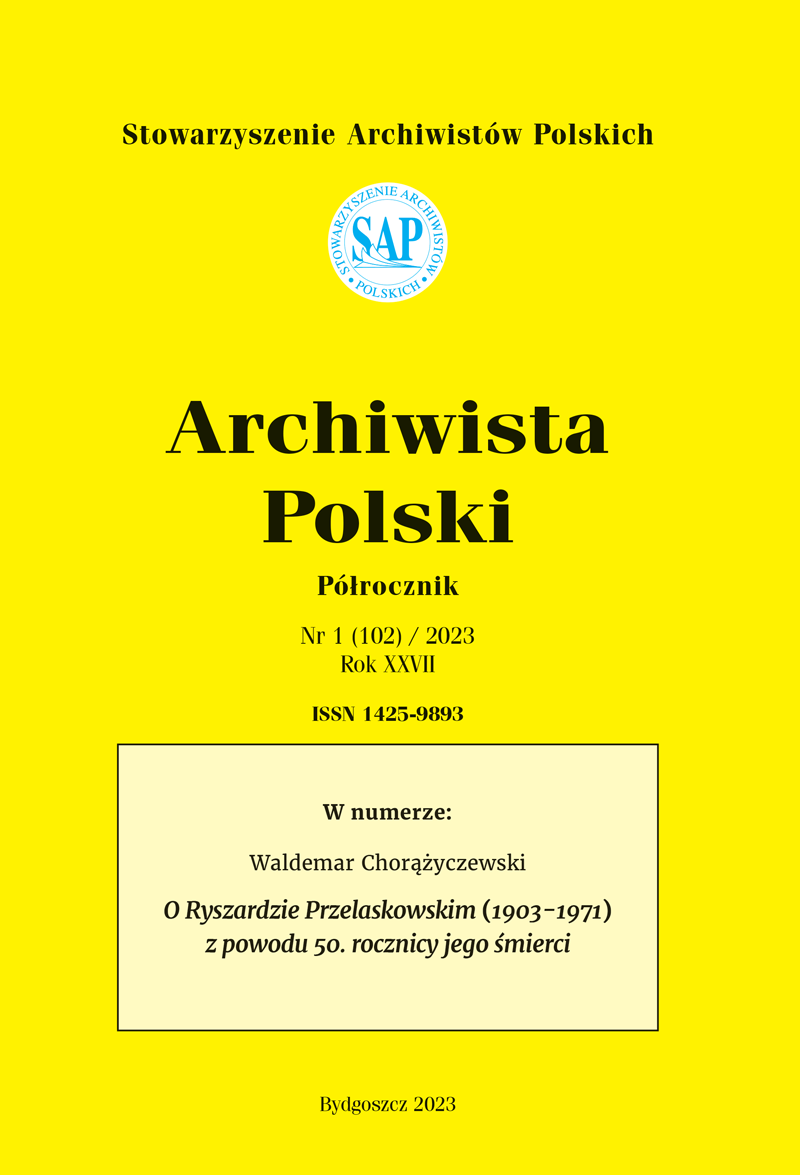
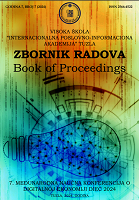
Compliance is an important concept for information security managers to understand. Compliance means adhering to a rule or set of rules. In the case of information security, compliance refers to the rules to which people, systems, and processes are expected to comply - these are typically laws, regulations, policies, standards, guidance or specifications. Effective compliance management requires a disciplined, repeatable approach to enterprise security management that, among other things, should include development of baseline enterprise security standards - the identification of all the security categories and controls applicable to the organization. In this paper, we talk about the approach that, based on good industry practices, information security managers in Bosnia and Herzegovina can use to develop a baseline enterprise security standard for effective compliance management.
More...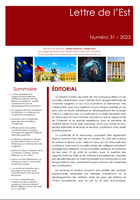
Given the exposure of the Balkan countries to cyberattacks, particularly in Albania and Montenegro, the article proposes to analyze the measures that have been taken to counter these attacks, which are detrimental to the proper functioning of institutions. The European Union thus seems to be a vector of progress for cybersecurity in the Balkan region, meeting security requirements both through existing mechanisms and through solid cooperation at the European Union level.
More...
This paper provides a systematic literature review of studies investigating digital twin-enabled industrial Internet of Things, synthetic data and predictive maintenance tools, virtual simulation and computer vision algorithms, and cloud-based cognitive and machine intelligence technologies. Throughout February 2023, a quantitative literature review of the Web of Science, Scopus, and ProQuest databases was performed, with search terms including “smart shop floor autonomous manufacturing in the industrial metaverse” + “robotic navigation and digital twinbased cyber-physical production systems,” “virtual 3D scene simulation and deep learning-assisted smart process management tools,” and “immersive geospatial data visualization and distributed artificial intelligence technologies.” As research published in 2022 and 2023 was inspected, only 166 articles satisfied the eligibility criteria, and 20 mainly empirical sources were selected. Data visualization tools: Dimensions (bibliometric mapping) and VOSviewer (layout algorithms). Reporting quality assessment tool: PRISMA. Methodological quality assessment tools include: ASReview Lab, CASP, METAGEAR package for R, PICO Portal, SWIFT-Active Screener, and Systematic Review Accelerator.
More...
This essay explores the profound philosophical, ethical, epistemological, and societal implications of data and datafication, a process transforming vast aspects of human life into quantifiable data. The paper raises foundational questions about the nature of data, its representation of reality, the biases inherent in data driven methods, and the broader impacts of datafication on society, governance, and individual identity.
More...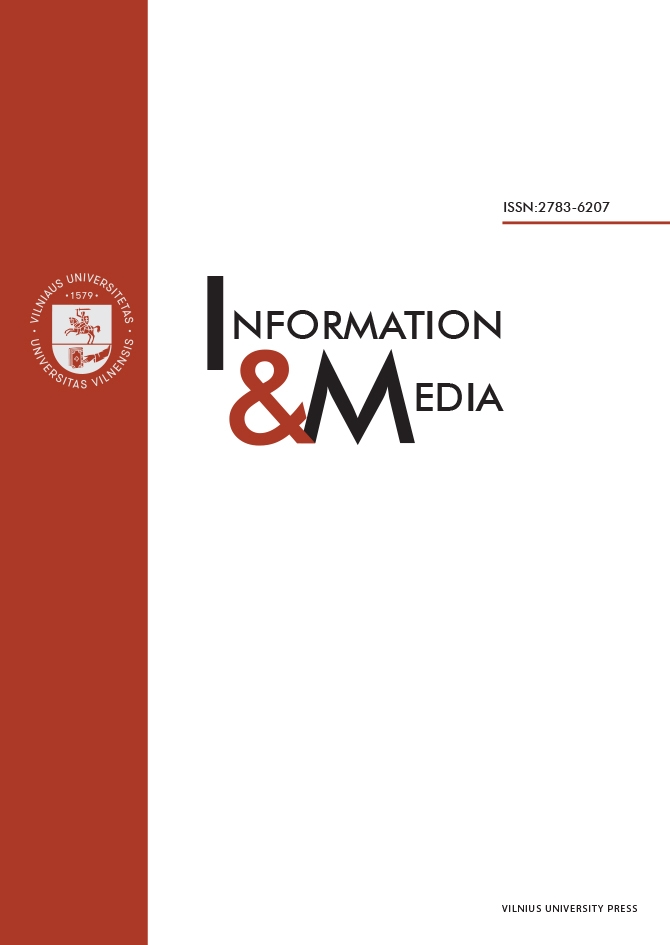
In the era of digital communication, social networking platforms have become important tools for the creation and dissemination of collective memory and identity. However, the dynamic nature of these platforms, together with their commercial nature and limited archiving capabilities, pose a number of challenges for researchers seeking to research conversations on heritage, history, memory and identity on social networking sites. This article presents a digital research data archive that helps address these challenges, and also shares best practices in creating and practically applying this archive, enabling the semantic and comprehensive collection, storage, visualization, and analysis of social media discussions.
More...
The aim of this systematic review is to synthesize and analyze multidigital twin cooperation in smart industrial equipment and manufacturing environments. A quantitative literature review of ProQuest, Scopus, and the Web of Science was carried out throughout July 2024, with search terms including “Internet of Things reinforcement learning-based autonomous manufacturing operations in the industrial metaverse” + “context-aware augmented reality and Industry 4.0 cyber–physical production multi-robotic systems,” “digital twin artificial intelligence sensing and 3D immersive virtual reality technologies,” and “environment mapping and computer vision algorithms.” As research published in 2022 and 2023 was inspected, only 153 articles satisfied the eligibility criteria, and 18 mainly empirical sources were selected. Data visualization tools: Dimensions (bibliometric mapping) and VOSviewer (layout algorithms). Reporting quality assessment tool: PRISMA. Methodological quality assessment tools include: AMSTAR, JBI SUMARI, Litstream, MMAT, PICO Portal, and SRDR+
More...
The present study systematically reviews the existing research on autonomous manufacturing plants in the virtual environment of the metaverse. Throughout July 2024, a quantitative literature review of the Web of Science, Scopus, and ProQuest databases was performed, with search terms including “autonomous manufacturing plants in the virtual environment of the metaverse” + “multi-sensor fusion and 3D digital twin modeling technologies,” “collaborative industrial artificial intelligence-based Internet of Things factory and mobile edge computing networks,” and “context-aware augmented reality and machine learningbased production planning systems.” As research published in 2022 and 2023 was inspected, only 159 articles satisfied the eligibility criteria, and 20 mainly empirical sources were selected. Data visualization tools: Dimensions (bibliometric mapping) and VOSviewer (layout algorithms). Reporting quality assessment tool: PRISMA. Methodological quality assessment tools include: Abstrackr, CASP, Colandr, JBI SUMARI, Nested Knowledge, and ROBIS.
More...
At present, there are security threats and dangers to develop and use and therefore to maintain a complete information system. Great care should be taken to protect the information systems. With the complete development of the information system there is an increasing threat and danger to that system as well as numerous attacks on IT fields. In order to prevent security threats and dangers, great attention must be paid to the security of information systems. This thesis presents the most common types of threats and dangers that may occur in the information system.
More...
Foreign Office archive has the primary task of the already established area of its activity to keep track of all holders of archives and current records, based on these records, the development of an electronic database that provides much more information about the respective register as well as the archival documentation in one place. This ensures a higher quality results in the field of one of the Archives. Today we know that the state of archive documents on the ground is in very poor condition, and therefore, in this way should be made significant progress in registering owners of archives and registry materials. In this paper, we follow the experience of the Archives of Una-Sana Canton, based in Bihac.
More...